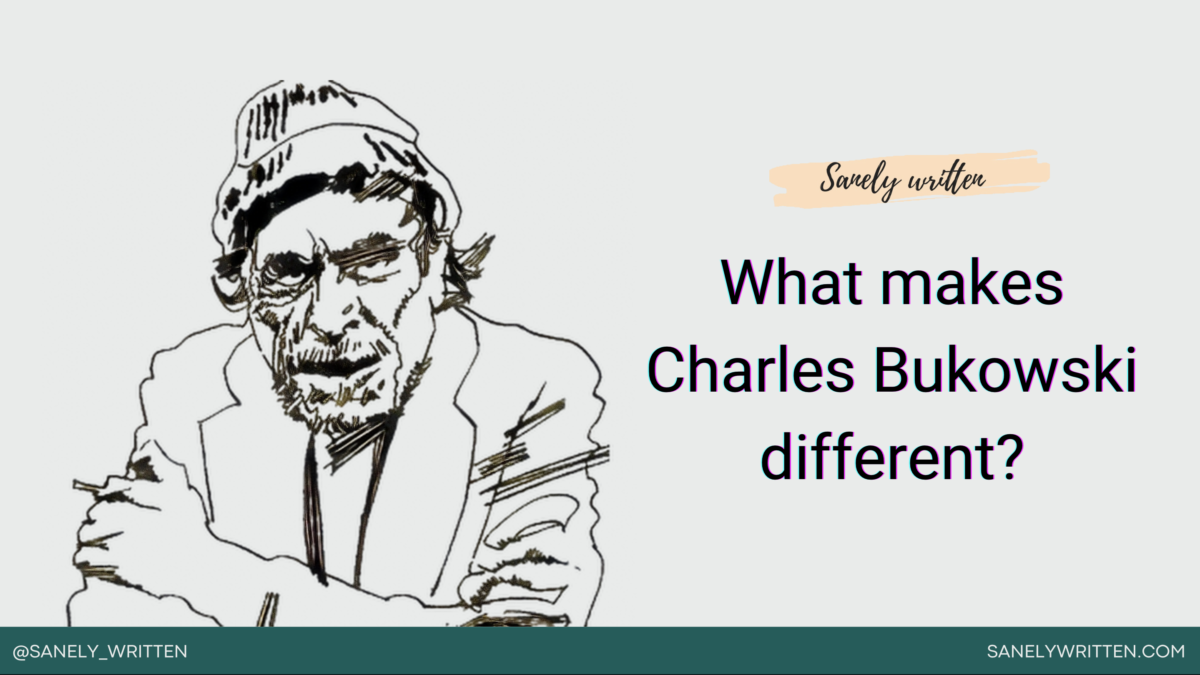Imagine a setting of the early to mid-20th century. You are flipping through a magazine where the pages have a rough, almost gritty texture under your fingers. And it was not about texture alone. These magazines were printed on the cheapest paper available and were filled with tales that were just as raw as the printed paper. The paper, made from wood pulp, gave the magazines and the genre their name: pulp. You might not be fully at ease with this genre. Maybe you hate it because it is not decorated. The stories or the pages are not shiny. But allow us to make you reconsider. Allow us to normalise gritty realism, straightforward prose, raw emotions, and seedier sides of life. As it happened to many great writers, it took years for the world to realise that at the pinnacle of this unvarnished literary world of pulp literature stood Charles Bukowski, the undisputed king of this genre. In this piece, we will try to find out what makes him different.
What Can We Do?
at their best, there is gentleness in Humanity.
some understanding and, at times, acts of
courage
but all in all it is a mass, a glob that doesn't
have too much.
it is like a large animal deep in sleep and
almost nothing can awaken it.
when activated it's best at brutality,
selfishness, unjust judgments, murder.
- Charles Bukowski
Charles Bukowski was born in Germany and moved to the United States as a child with his family. His Germanic demeanour made it difficult for him to make friends and severe acne left him painfully self-conscious. Bukowski endured a harsh, often abusive father, whom he would later describe as a great teacher, one who taught him the lesson of pain without reason.
He left college to follow his calling of writing. Much of Bukowski’s life was spent in grinding poverty. He worked menial, blue-collar jobs that barely kept him afloat. He drifted in and out of writing. He abandoned it when his early works found little success. Most of his writings remained unpublished. Disillusioned, he quit writing altogether for 10 years, but a near-death experience with bleeding ulcers forced him to rethink his life. He left his job at the post office to pursue writing full-time but came back when any significant success eluded him once more. This time, however, he did not abandon writing and wrote every day before heading to work. Those ‘lost 10 years’ became the base for his literary portrayal of himself as Henry Chinaski.
For many years, Bukowski toiled in obscurity. He wrote over a thousand poems and over a hundred short stories despite the lack of recognition. It wasn’t until his 50s that he secured a deal with a publisher. It finally allowed him to survive on his writing alone. After unrewarding decades of effort, Bukowski’s work began to gain traction but the magnitude of it was still not equal to what he truly deserved.
But the abject poverty or struggle is not the only reason that sets him apart. His life is marked with scandals, unapologetic alcoholism, and an approach to revolt against almost everything. He had so many flaws that people had to pick and choose to resolve his legacy. The only thing that endures this conflict is his honesty. He never watered it down, never tried to layer his saying in sweet metaphors. He was romantic and blunt simultaneously. While any other poet of his era would reserve bluntness for himself, Bukowski gave that to the reader. While any other poet would say, ‘Maybe you should rethink that’, Bukowski says ‘Don’t do it.’
so you want to be a writer?
if it doesn't come bursting out of you
in spite of everything,
don't do it.
unless it comes unasked out of your
heart and your mind and your mouth
and your gut,
don't do it.
...
- Charles Bukowski
This ability not to shy away from saying the bleakest thing created a new type of genre ‘dirty realism’ like the poetry compilation It Catches My Heart in Its Hands where he writes the minutest details about the prostitutes, paupers, alcoholics, and gamblers.
To The Whore Who Took My Poems
some say we should keep personal remorse from the poem,
stay abstract,
and there is some reason in this,
but jezus;
twelve poems gone and I don't keep carbons and you have my paintings too,
my best ones; its stifling:
are you trying to crush me out like the rest of them?
why didn't you take my money? they usually do
from the sleeping drunken pants sick in the corner.
next time take my left arm or a fifty
but not my poems:
I'm not Shakespeare
but sometime simply
there won't be any more, abstract or otherwise;
there'll always be money and whores and drunkards
down to the last bomb,
but as God said,
crossing his legs,
I see where I have made plenty of poets
but not so very much poetry.
- Charles Bukowski
We will see his idea of taking conscious risk in some details in the discussion of his novel Ham on Rye which came quite late in his literary career when the rough edges of his earlier work had sharpened into a profound reflection on the causes of his obsessions. Chinaski (Bukowski’s alter ego), dissects the American dream with laser precision of someone who has lived in its dark shadows.
Chinaski’s father is a man enslaved by the ideals of homeownership and relentless work. He is the embodiment of a life that promises safety but delivers torment. His frustration spills over in violent outbursts, and Chinaski is often on the receiving end. The beatings are arbitrary. They are born not of discipline but of a deeper dissatisfaction.
Through these experiences, Chinaski learns the futility of traditional benchmarks of success. He sees firsthand the misery that a so-called “normal” life can bring. So, he rejects his father’s path entirely and chooses a life on the margins. He chooses uncertainty and risk to replace the false security of the nuclear family. But this risk is not reckless. It is a deliberate gamble, an attempt to find something more meaningful in the chaos.
Chinaski is able to gamble sensibly because Bukowski’s life has taught him a deeper understanding of risk. He recognises that there is a delicate balance in betting, just as in life: wager too little, and you miss out on potential wins; wager too much, and you risk everything. The wisdom he imparts is simple. To bet and take action, but not to overthink it.
The problem was you had to keep choosing between one evil or another, and no matter what you chose, they sliced a little bit more off you, until there was nothing left.
Bukowski’s philosophy is clear: to live fully, one must gamble. He is a man who told you on your face that if it is not coming out from/through you, don’t do it. But the same man asked you to gamble and keep taking risks. So it might come as a surprise to see his gravestone.

The answer to this is as straightforward as the man. He had explained this in many of his writings, particularly in two letters. One to John William Corrington,
Somebody at one of these places asked me, ‘What do you do? How do you write, create?’ You don’t, I told them. You don’t try. That’s very important, ‘not’ to try, either for Cadillacs, creation, or immortality. You wait, and if nothing happens, you wait some more. It’s like a bug high on the wall. You wait for it to come to you. When it gets close enough, you reach out, slap out, and kill it. Or if you like its looks, you make a pet out of it.
And the other to William Packard,
Too many writers write for the wrong reasons. They want to get famous or they want to get rich or they want to get laid by the girls with the bluebells in their hair.. When everything goes best, it’s not because you chose writing, but because writing chose you. We work too hard. We try too hard. Don’t try. Don’t work. It’s there. Looking right at us, aching to kick out of the closed womb.
Bukowski never consciously looked for things to write about. If you had to try to pursue a thing that you want to pursue, maybe it is not meant for you. Let your pursuit choose you and not the other way around. So, in fact, if you can understand that passion comes by being honest and without forcing it, through the writings of Bukowski, you might actually hear him saying this poem.
Roll the Dice
if you’re going to try, go all the
way.
otherwise, don’t even start.
if you’re going to try, go all the
way.
this could mean losing girlfriends,
wives, relatives, jobs and
maybe your mind.
go all the way.
it could mean not eating for 3 or 4 days.
it could mean freezing on a
park bench.
it could mean jail,
it could mean derision,
mockery,
isolation.
isolation is the gift,
all the others are a test of your
endurance, of
how much you really want to
do it.
and you’ll do it
despite rejection and the worst odds
and it will be better than
anything else
you can imagine.
if you’re going to try,
go all the way.
there is no other feeling like
that.
you will be alone with the gods
and the nights will flame with
fire.
do it, do it, do it.
do it.
all the way
all the way.
you will ride life straight to
perfect laughter, its
the only good fight
there is.
- Charles Bukowski



